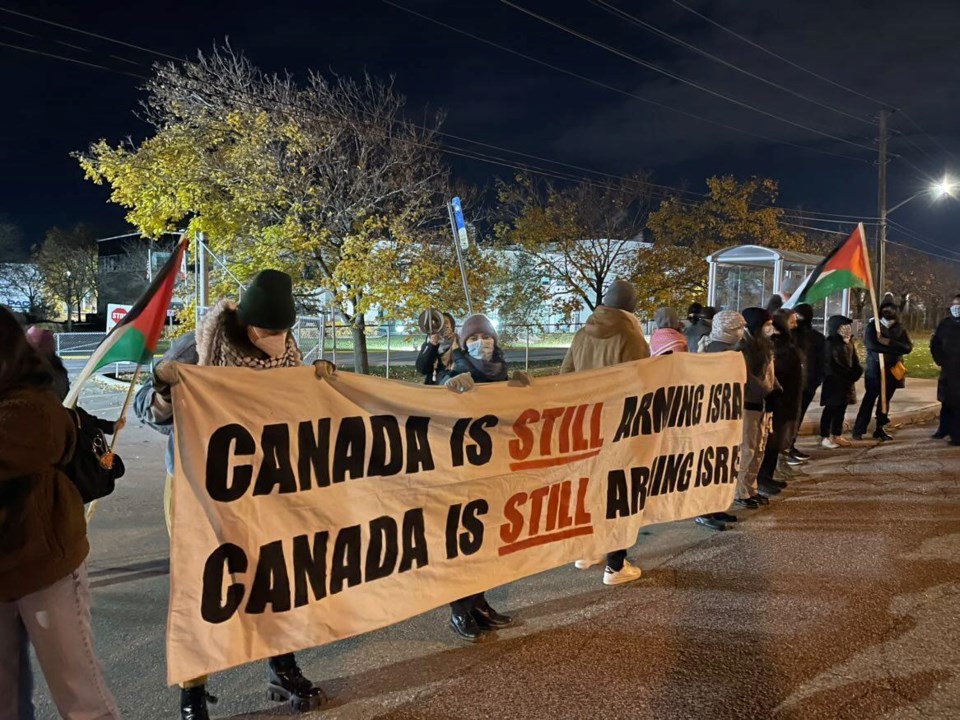Where is the line between a protester’s right to be heard and a worshipper’s right to safely attend a service?
Oakville will explore that question in the coming early months of 2025, as it considers regulating protests that make it difficult for people to access schools, places of worship and other locations of "vulnerable social infrastructure."
The town has joined a growing list of Ontario municipalities that have either enacted or are investigating so-called"“bubble bylaws" – rules that keep protesters at a distance from sensitive locations.
After hearing from more than a dozen delegates during a lengthy (and sometimes disorderly) council meeting two week ago on Monday, Dec. 16, Oakville councillors voted unanimously to direct town staff to research and develop a draft bylaw.
The bylaw is to be ready for town council to consider and vote on by the end of March 2025.
Staff has been told that it should "regulate certain forms of protests near vulnerable social infrastructure, recognizing that nothing in the bylaw should prevent peaceful protests or demonstrations."
The bylaw is to establish access zones that "don’t exceed what is reasonably necessary," as well as penalties that are "rational and proportionate."
It is expected that town staff will look at bylaws in Vaughan, Brampton and Calgary, as well as ones under development in Mississauga and Ottawa.
In June 2024, a new Vaughan bylaw created a 100-metre bubble around "vulnerable social infrastructure," which it defined as including religious institutions, schools, childcare centres, hospitals, and congregate care facilities.
Ward 5 councillor Jeff Knoll initiated the motion calling for an Oakville bylaw.
"Peaceful protest is an essential part of democracy, giving people the right to express dissent and advocate for change," he said. "At the same time, residents have an equally important right to attend schools, to worship, to access childcare or other community services free from disruption, intimidation or harm."
“This bylaw is not about silencing dissent,” Knoll added.
"It is not directed to any particular culture or religious group. It’s about drawing a clear, reasonable boundary to ensure public spaces remain welcoming and safe for everyone."
Halton’s Interfaith Council, which represents eight major faith groups, expressed support for the creation of a bubble bylaw.
Local Liberal MPs Anita Anand, Pam Damoff, Karina Gould and Adam van Koeverden also threw their support behind the idea in an open letter to Oakville council.
Nancy Freedman, of Oakville’s Shaarei-Beth El synagogue, said the local Jewish community is experiencing “fear and concern with the rising tensions.” She said a bylaw would help prevent conflicts before they arise and would be fair in applying to all places of worship.
"As a congregation, we are now paying for security at our synagogue for all religious services and holidays, right here in our town of Oakville," said Freedman.
But nine delegates told councillors that bubble bylaws infringe on the essential right to peaceful protest guaranteed by Canada's Charter of Rights and Freedoms.
"In the past year, citizens have actively mobilized to bring attention to the ongoing genocide in Palestine, where citizens have participated in some of the largest demonstrations the town has witnessed," said Deirdre Cahill. "All of them have occurred peacefully."
"To suddenly impose broad restrictions on protests risks stifling essential democratic expression," she added. "This is not the path that Oakville should take."
Read more here: Opposing Palestine protests divide at Oakville town hall
With police capable of managing Oakville’s 42 reported protests in 2024, there’s no reason to add a bylaw, argued Hugh Doherty.
"It is very clear that there are elements within today’s society that want to silence the voices of Palestinian people and their supporters or put them where they can’t be heard – be that 100 yards away or 1,000 yards away, whatever."
Resident Madeleine Raad, who identified herself as "a proud Palestinian who grew up in Oakville," said the proposed bylaw may also "reinforce a perception that peaceful protests are inherently threatening."
"This narrative risks stigmatizing those who exercise their democratic rights and alienating community members who already feel marginalized," she added.
